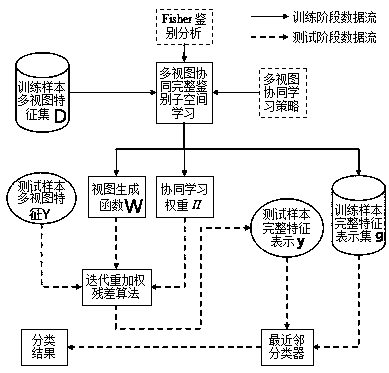Face recognition method based on multi-view collaborative complete discriminant subspace learning
A subspace learning and face recognition technology, applied in the field of face recognition based on multi-view collaborative complete discriminative subspace learning, can solve the problem of enhancing the discriminativeness of the complete subspace, the adverse effects of multi-view subspace learning, and the inconsistency of single view information. Integrity and other issues, to achieve the effect of enhancing the identification performance and improving the identification performance
- Summary
- Abstract
- Description
- Claims
- Application Information
AI Technical Summary
Problems solved by technology
Method used
Image
Examples
Embodiment Construction
[0019] A face recognition method based on multi-view collaborative complete discriminative subspace learning, such as figure 1 Shown, assuming D={z vij |1≤v≤m,1≤i≤c,1≤j≤n i} represents the feature representation of n training samples in m views, X={x ij |1≤i≤c,1≤j≤n i} represents the complete feature representation of these n training samples in the potential complete subspace, where m and c represent the number of views and the number of categories of samples, respectively, n i Indicates the number of samples of class i, The method includes the following steps:
[0020] (1) Use the objective function based on Cauchy loss and Fisher discriminant analysis to obtain the complete feature representation of n training samples in the potential complete subspace X, v view generation functions and v non-negative collaborative learning weights Π=[π 1 ,...,π v ];
[0021] (2) In view of the non-convex nature of the objective function, the solutions X, W and Π of the objec...
PUM
 Login to View More
Login to View More Abstract
Description
Claims
Application Information
 Login to View More
Login to View More - R&D
- Intellectual Property
- Life Sciences
- Materials
- Tech Scout
- Unparalleled Data Quality
- Higher Quality Content
- 60% Fewer Hallucinations
Browse by: Latest US Patents, China's latest patents, Technical Efficacy Thesaurus, Application Domain, Technology Topic, Popular Technical Reports.
© 2025 PatSnap. All rights reserved.Legal|Privacy policy|Modern Slavery Act Transparency Statement|Sitemap|About US| Contact US: help@patsnap.com



